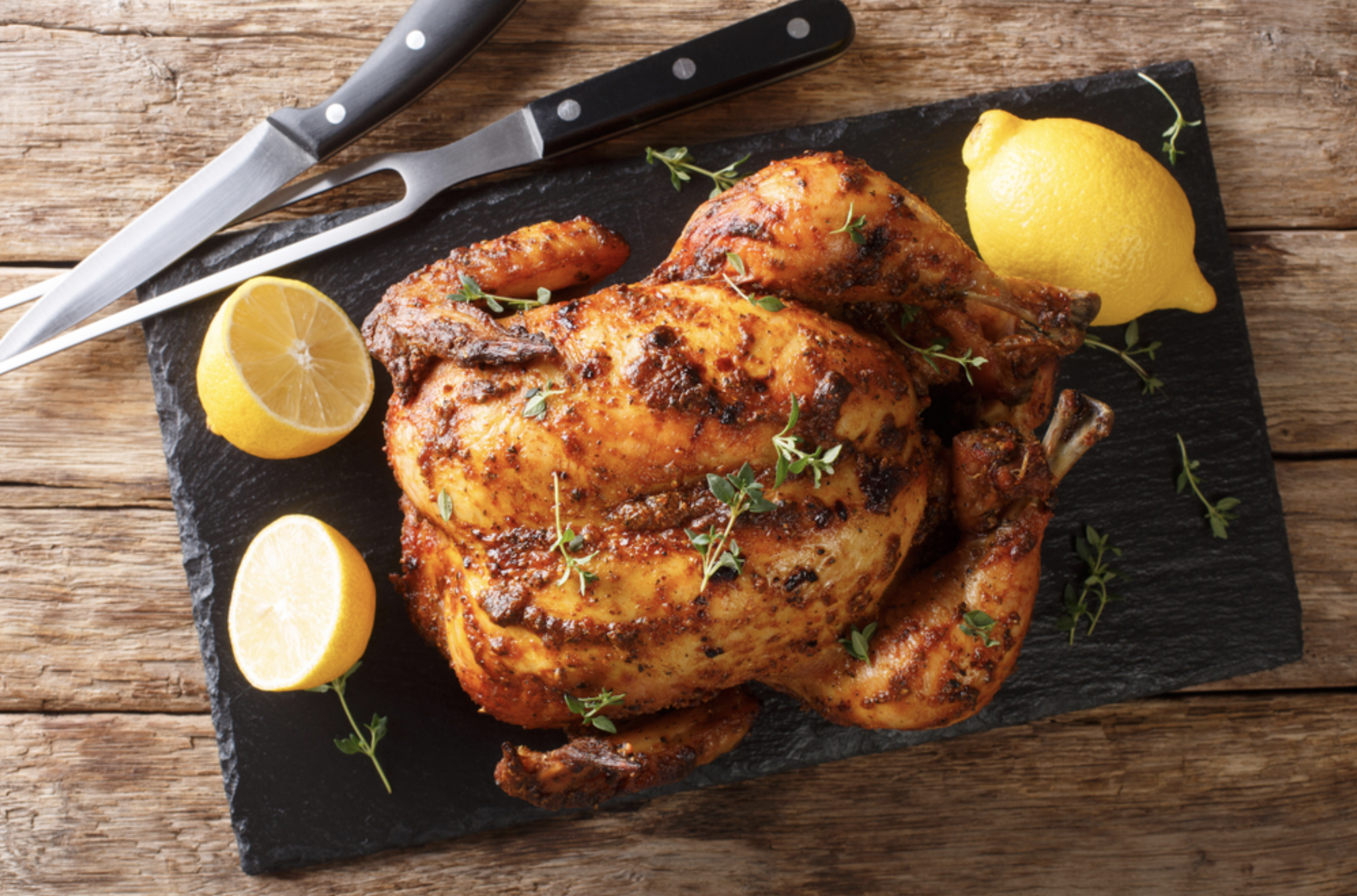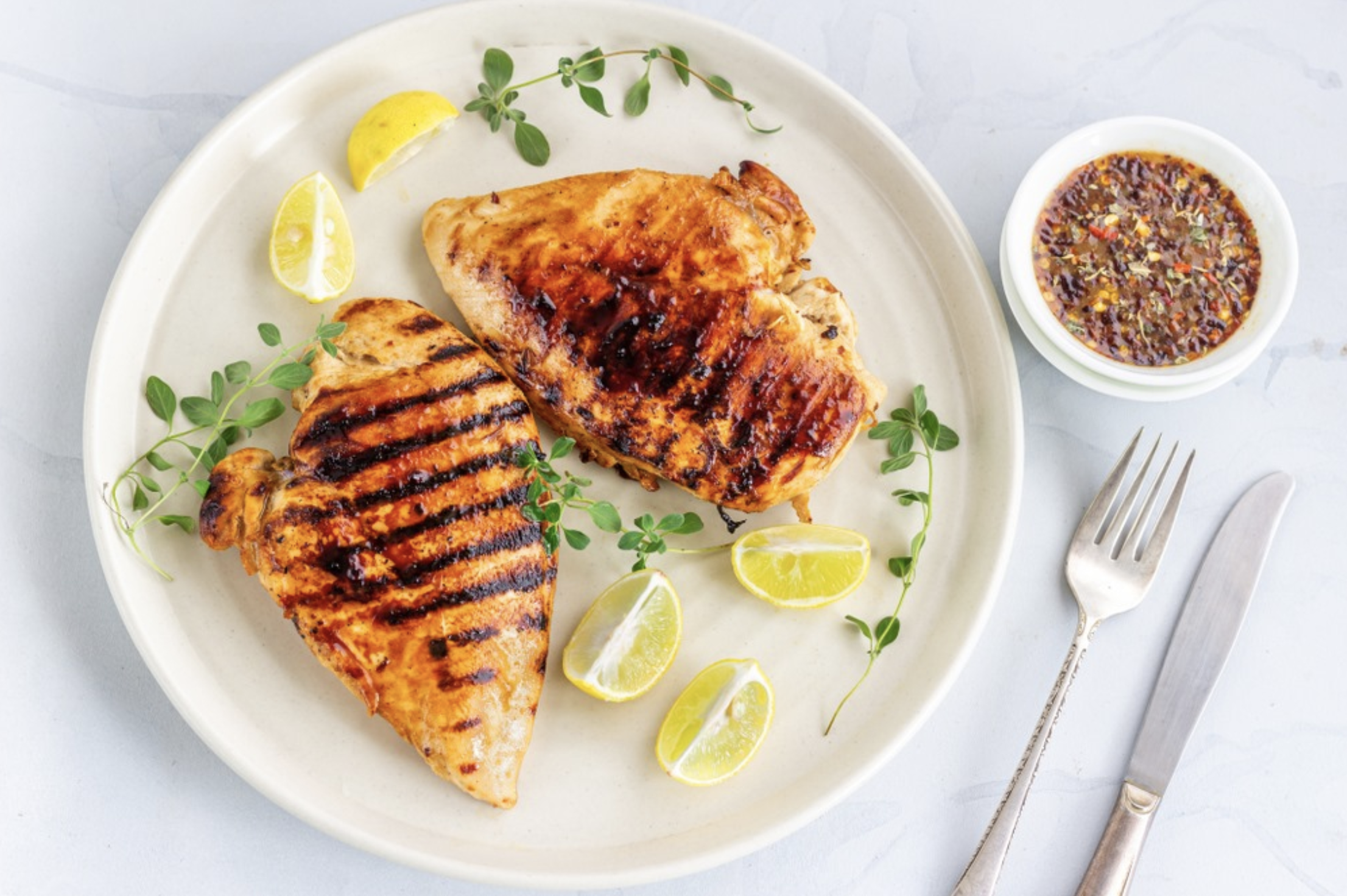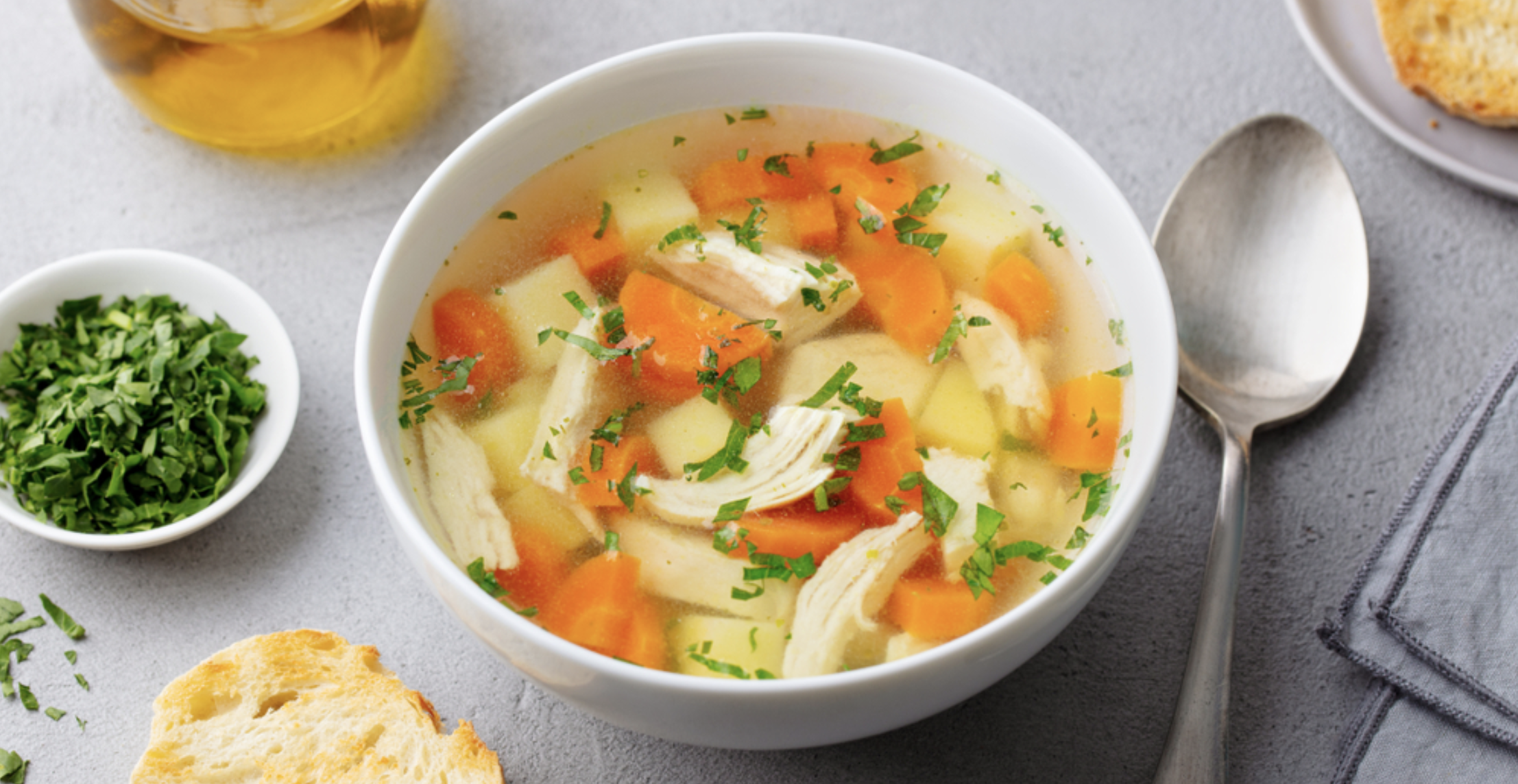Grilled chicken is a delicious dish that can awaken all of our senses. However, sometimes you will have a stomach ache after eating chicken. This makes a lot of people curious to find out why does grilled chicken hurt my stomach. To help you get the answer, Sunset Bar and Grill has researched and will give you an explanation in this article.
1. Why does my stomach hurt after eating chicken
Because campylobacter and salmonella are the two common bacteria that can infect chickens. So every time you eat chicken, if you end up having an upset stomach, that means your body has an allergy or food intolerance. In some isolated cases, stomach pain after eating chicken is most likely related to food poisoning.

Grilled chicken can be the main cause of your stomach ache
Food poisoning
Chicken meat poisoning occurs if the chicken is undercooked, comes into direct contact with animal manure, or is left out for too long. After eating contaminated chicken, you will experience abdominal pain, diarrhea, vomiting, nausea, and cramps within a few hours.
To prevent food poisoning with chicken, wash your hands before and after handling raw chicken, make sure the chicken is fully cooked, and do not come into contact with any potentially contaminated surfaces.
Most cases of food poisoning cause severe and intense diarrhea and vomiting, which can lead to dehydration. If you cannot stop vomiting, do not eat or drink for two hours.
Food poisoning has no cure and is most effectively treated with rest, dietary changes, and clearer fluids. Eat bland foods, such as toast, white rice, bananas, boiled potatoes, and carrots until the stool becomes normal. Avoid foods and drinks that can aggravate the gut, such as caffeine, spicy foods, and alcohol.
Allergies and intolerances
After eating certain foods, food allergies and intolerances are two conditions that can cause stomach pain. Some chicken dishes are made with allergenic foods, such as eggs, wheat, milk, and soy. For example, fried chicken may contain wheat from breadcrumbs and eggs in the dough.
Some processed chicken contains additives that can cause food intolerance symptoms such as lactose and MSG. Food allergies are caused by defects in the immune system, while food intolerances are the result of your digestive system’s inability to properly process certain ingredients, sugars, and proteins.
2. How to identify that you are allergic to chicken?
An elimination diet can be used to determine if the chicken is causing adverse reactions in your body. Stop eating chicken for two weeks. If you experience any reactions during this elimination period, make a note of which foods are causing the symptoms.
After two weeks, eat an ounce of chicken and record how your body reacts to it. Over the next few days, increase the amount of chicken you eat by one ounce. Use only unprocessed, pre-cooked, or seasoned regular chicken. Talk to your doctor about your findings.
3. What should we do to avoid stomach aches after eating chicken?
In order to avoid stomach aches, please do the following this rules:
- Place chicken in a refrigerator that is no warmer than 40 degrees Fahrenheit. Within two days, consume it. Chicken may be frozen and kept there indefinitely as long as it is frozen consistently. However, the quality of the chicken could decline over time.
- Safe defrosting of chicken requires never leaving it on the kitchen counter. Placing frozen chicken in the fridge the night before is the quickest way to defrost it. However, the USDA recommends that you follow these measures if you need to thaw chicken quickly: Put the chicken in a bag that won’t leak. Next, put that bag in a basin or other container with cold tap water.
4. How to prepare the grilled chicken so your stomach won’t get hurt?

You should prepare the chicken carefully before grilling
Preheat the oven for 5 to 10 minutes
Don’t skip this part of the process, even if you’re in a hurry. The preheating stage not only helps start the process of burning off leftover food and killing bacteria. But it also helps create tonight’s roasts.
An oven that isn’t preheated is too cold, relatively speaking, to cook your food correctly. If you clamp a piece of chicken on a griddle that is too cold, the grilled chicken will stick to the griddle and it will be nearly impossible to remove. What you will get when you try to move the stuck chicken is crumbs and rips, no perfect cuts.
Gas ovens may need a preheating time of 10 to 15 minutes because the flames and heat on these stoves are not as intense as a charcoal grill.
The metal or ceramic rods that manufacturers use take longer to produce more radiant heat (heat that cooks the meat that doesn’t come into contact with the hot grid) to warm enough for cooking and they’re redesigned. Charcoal grills naturally generate more radiant heat, so they may not take long to warm up.
Scrub the grill surface clean
Don’t waste time scrubbing the cold grill and don’t waste any more minutes after you’ve cooked it to clean it. The best times to clean your grill are right after it’s preheated and before you start cooking again. That’s when the grease and residue on the grill will be easiest to remove.
And any food, or the remnants of animals that visit between your meals, will be thoroughly removed. Use a sturdy wire brush. If the bristles come loose during cleaning, throw the brush away. You don’t want loose cords near your food.
Oil the net if necessary
Many foods won’t stick to a properly heated grill, but some delicacies like fish, vegetables, and fruit, may just be because of their tender nature. You can help keep them from sticking, which will reduce the build-up of dirt that can later become a target for bacteria, by oiling them.
Use an oil with a high smoke point, like canola or corn oil. Olive oil can burn too easily, causing food to taste bitter or lose flavor. To quickly oil your baked goods, dip a paper towel in a small bowl filled with oil. Take the long tongs, take a paper towel, and rub it on the mesh. If flames flare up from charcoal or burners, wait until they’re out so there’s no risk of burning the tissue.
5. Some chicken recipes that are good for your stomach

Chicken soup is a healthy food for your stomach
Chicken soup
They say that chicken soup is good for the soul, but it is also good for stomach problems. This food is not a main meal and eating it helps you replenish both the nutrients and electrolytes that you have lost due to illness as well as strengthen your immune system.
In fact, speaking of your immune system, researchers from the University of Nebraska found that 12 out of 13 brands of chicken soup helped suppress inflammatory white cells, the cause of disease. for you. (They believe it has to do with the amino acid cysteine that is released when you cook chicken.)
Skinless chicken breast
If your stomach wants some meat, good for you! The trick to getting this food back into your diet now is that it’s as bland as possible. First, remove the skin as it is a source of fat. Spices are sure to upset the stomach, so avoid them and eat protein after it’s steamed or boiled in water or broth so it doesn’t dry out.
If you’re making chicken soup at home, simply eat the meat from the plain chicken breast after the bones have flavored the broth. By the way, even if it’s not made in broth, you’ll still get the amino acid cysteine from cooked chicken.
Final Thoughts
So, to answer the question: why do you have a stomach ache after eating chicken? If you eat grilled chicken and have a stomach ache, it could be because your body is allergic to chicken, or you have handled the meat improperly. Depending on each case, you will need to find a more suitable treatment. Do not forget to share this article by Stansidlehour with your relatives or friends to protect your health.
>>> See more: Can You Make Grilled Cheese With Vegetable Oil?